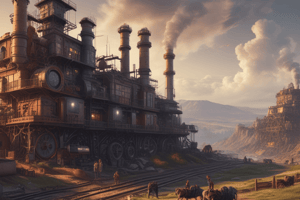Podcast
Questions and Answers
Before the Industrial Revolution, machines were primarily extensions of ______ effort
Before the Industrial Revolution, machines were primarily extensions of ______ effort
human
Machines gained semi-autonomy and began to fundamentally alter human interactions with the ______ world
Machines gained semi-autonomy and began to fundamentally alter human interactions with the ______ world
natural
The Industrial Revolution marked a period of rapid ______ and the widespread use of machines
The Industrial Revolution marked a period of rapid ______ and the widespread use of machines
industrialization
Initially driven by the ______ engine, this era saw the mechanization of textiles, iron production, and shipping
Initially driven by the ______ engine, this era saw the mechanization of textiles, iron production, and shipping
Within factories and workshops during the Industrial Revolution, machines were often closely integrated into ______ spaces
Within factories and workshops during the Industrial Revolution, machines were often closely integrated into ______ spaces
Machines like steam engines, looms, and power looms were designed to perform ______ tasks
Machines like steam engines, looms, and power looms were designed to perform ______ tasks
The Industrial Revolution and the ubiquity of machines transformed daily life and the global economy. Machines provided faster, cheaper, and more efficient processes, leading to an increase in ______, standardization, and the growth of the middle class.
The Industrial Revolution and the ubiquity of machines transformed daily life and the global economy. Machines provided faster, cheaper, and more efficient processes, leading to an increase in ______, standardization, and the growth of the middle class.
Machines excel at efficiency and statistical analysis but struggle with context, framing problems, and non-quantifiable factors. It is essential to focus on developing skills like creativity, critical thinking, and ______.
Machines excel at efficiency and statistical analysis but struggle with context, framing problems, and non-quantifiable factors. It is essential to focus on developing skills like creativity, critical thinking, and ______.
In the age of machines, it is crucial to foster personalized, adaptive, and creative approaches to learning and development, ensuring that humans can thrive alongside and ______ machines.
In the age of machines, it is crucial to foster personalized, adaptive, and creative approaches to learning and development, ensuring that humans can thrive alongside and ______ machines.
Human skills development remains vital for success in industries where machines play a significant role, from manufacturing to ______ and beyond.
Human skills development remains vital for success in industries where machines play a significant role, from manufacturing to ______ and beyond.
By developing and incorporating our unique human skills, we can shape a future that is both technology-driven and ______-centric.
By developing and incorporating our unique human skills, we can shape a future that is both technology-driven and ______-centric.
As we continue to embrace the power of machines, it is essential to ensure that technology serves humanity and promotes a more sustainable, equitable, and ______ world.
As we continue to embrace the power of machines, it is essential to ensure that technology serves humanity and promotes a more sustainable, equitable, and ______ world.
Flashcards are hidden until you start studying
Study Notes
The Age of Machines: Exploring the Industrial Revolution
The Industrial Revolution laid the groundwork for the age of machines, ushering in transformative changes that continue to shape our world today. This article will dive into the history and impact of machines, particularly focusing on the pivotal role of the Industrial Revolution.
Pre-Industrial Innovations
Before the Industrial Revolution, machines were primarily extensions of human effort, serving as simple tools or instruments. However, the 18th and 19th centuries saw a shift: machines gained semi-autonomy and began to fundamentally alter human interactions with the natural world.
The Industrial Revolution
The Industrial Revolution, which began in the 18th century, marked a period of rapid industrialization and the widespread use of machines. Initially driven by the steam engine, this era saw the mechanization of textiles, iron production, and shipping, leading to a vast increase in efficiency, productivity, and wealth.
Machines in the Age of Industry
Within factories and workshops during the Industrial Revolution, machines were often closely integrated into personal spaces and became essential to manufacturing processes, leading to the mechanization of society. Machines like steam engines, looms, and power looms were designed to perform repetitive tasks, allowing workers to focus on more complex or creative responsibilities.
Impact of Machines on Society and Economy
The Industrial Revolution and the ubiquity of machines transformed daily life and the global economy. Machines provided faster, cheaper, and more efficient processes, leading to an increase in production, standardization, and the growth of the middle class.
Human Skills in the Age of Machines
While machines excel at efficiency and statistical analysis, they struggle with context, framing problems, and non-quantifiable factors. As a result, it is essential to focus on developing skills that machines find challenging, such as creativity, critical thinking, and adaptability.
The Future of Machines and Humans
In the age of machines, it is crucial to foster personalized, adaptive, and creative approaches to learning and development, ensuring that humans can thrive alongside and alongside machines. Human skills development remains vital for success in industries where machines play a significant role, from manufacturing to finance and beyond.
As we continue to embrace the power of machines, it is essential to ensure that technology serves humanity and promotes a more sustainable, equitable, and prosperous world. By developing and incorporating our unique human skills, we can shape a future that is both technology-driven and human-centric.
Studying That Suits You
Use AI to generate personalized quizzes and flashcards to suit your learning preferences.




